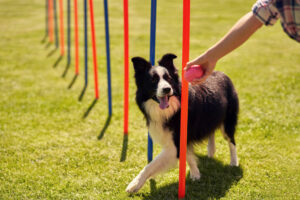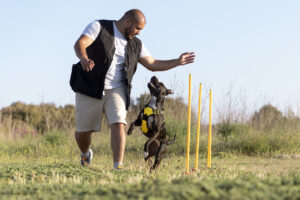We know massages to be fantastic for relaxation, but did you know that they’re not just for people? Dog massages have a wide variety of physical, mental, and even emotional benefits for your canine companion.
In this article, we’re listing down the five surprising benefits of dog massages!
Benefits of Dog Massages
Here are the surprising benefits that massages have for your (literally) pampered pooch.
1. Stress Relief
Dogs, like human beings, can suffer from stress and anxiety. Dog massage has been shown to alleviate anxiety and stress, which is a big benefit for any stressed-out dog.
By encouraging the production of endorphins, your dog’s natural feel-good chemicals, dog massage can assist to reduce these signs and induce calm.
This can make your dog feel more at peace and tranquil, leading to greater sleep and general well-being.
A dog massage, according to the American Kennel Club, is a fantastic technique to ease tension during thunderstorms, fireworks, or any other scenario causing your pet anxious
2. Improve Mobility
Your dog’s mobility and flexibility may decline as they age.
Dog massage helps improve circulation to stiff muscles and joints. Massage helps to stimulate blood flow, which relieves stress and soreness in your dog’s muscles.
Massage can prevent additional damage by increasing the range of motion and flexibility by releasing tight muscles and joints.
That said, this is also a reminder for all pet owners to exercise their dog daily. A tired dog is a happy dog, and you can’t go wrong with giving your dogs plenty of exercise.
Depending on your dog’s exact breed, they may need anywhere from 30 to 120 minutes of exercise per day.
3. Pain Relief
There’s a lot of painful physical afflictions that can affect dogs, including arthritis, hip dysplasia, and muscular strains.
Dog massages are especially beneficial if your dog suffers from an illness such as arthritis.
Massages can assist with these symptoms because it boosts blood flow to the afflicted regions, encouraging healing, and decreasing inflammation.
4. Detect Underlying Health Issues
Dog massages may also help in the detection of any underlying health concerns since you’ll be able to feel any lumps or bumps. Keep in mind that you shouldn’t massage your dog if they have an open wound, fracture, or infectious disorder because it can make the issue worse.
5. Strengthen Your Bond
Dog massages are an excellent way to bond with your dog. The physical closeness of such activity can enhance your relationship, making your bond stronger and deeper.
Massages can also help in the delopment of trust and a feeling of security, which is especially crucial for those who have been through trauma.
How to Massage Your Dog
Interested in giving your dog a massage now? Here’s a quick and easy guide on how to do it for beginners.
Step 1:
Place your dog on its side on a nice, level surface. Softly touch the region you wish to massage using flat palms.
Step 2:
Begin with the head then work your way down the body, gradually applying more pressure if your dog appears to be enjoying it. Circular motions should be used to massage your dog’s neck. Remember to use soft strokes when massaging your dog to ensure that they are comfortable during the procedure.
Step 3:
Massage the base of the head and the root of the tail gently. You can estimate how your dog wants their massage by watching out for their facial expressions and body language.
If you’re unsure how to massage your dog, it’s best to contact your veterinarian or a qualified dog massage therapist to verify that you are utilizing the proper methods and applying the proper pressure.
You can also purchase instructional manuals to help you massage your dog at home!
Conclusion
Dog massages are an excellent technique to induce relaxation, relieve discomfort, increase mobility, and deepen your relationship with your canine friend.
For more ideas on how to take care of your dog, visit the PetFitness blog today!








